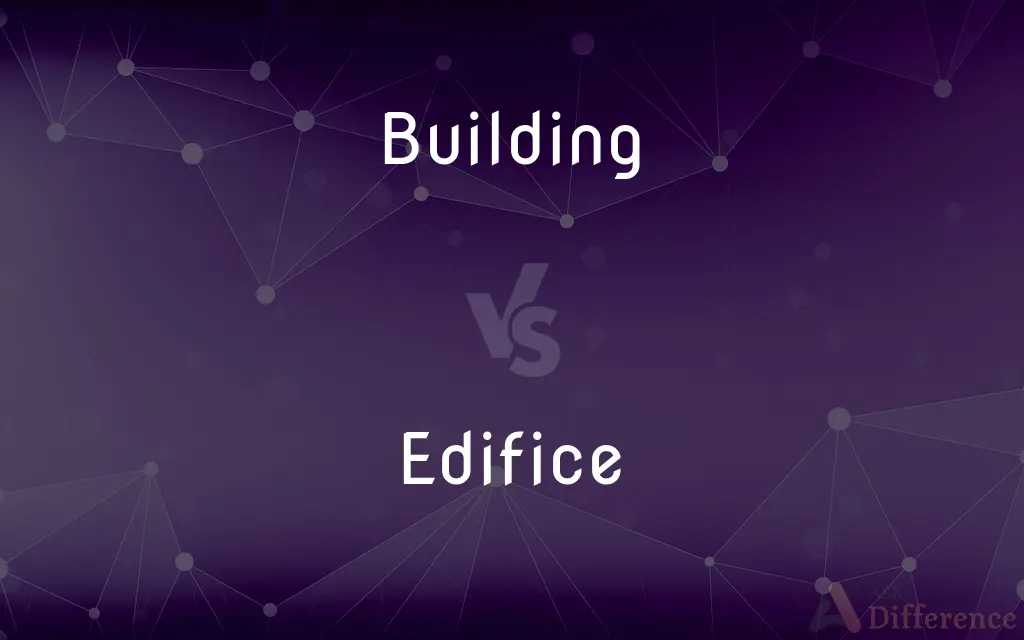Building vs. Edifice — What's the Difference?
By Tayyaba Rehman & Fiza Rafique — Updated on April 20, 2024
A building is any structure with a roof and walls, while an edifice is a large, imposing building often significant in cultural or historical context.

Difference Between Building and Edifice
Table of Contents
ADVERTISEMENT
Key Differences
Building refers to any structure used as a dwelling, office, or for any other purpose, encompassing a wide range of constructions from simple homes to skyscrapers. Whereas edifice is a term used specifically for large and impressive buildings, often grand in scale and used for public or religious purposes.
Buildings can be residential, commercial, or industrial, with uses varying widely from living spaces to manufacturing facilities. On the other hand, edifices are typically monumental, like cathedrals, palaces, or capitol buildings, serving as landmarks or symbols of significant societal values.
Building as a term also refers to the act of constructing something – the process of building. While edifice does not carry this additional meaning, focusing purely on the structure's grandeur and architectural significance.
Buildings are generally functional and are built to meet the practical needs of housing, work, or commerce. Whereas edifices often have an aesthetic or ceremonial importance that transcends basic functionality, reflecting artistic ambitions or political power.
Buildings can be simple in design and materials, catering to basic needs. In contrast, edifices are frequently constructed with an emphasis on durability and artistic detail, using materials and techniques that denote superiority and endurance.
ADVERTISEMENT
Comparison Chart
Definition
Any roofed and walled structure
A large, impressive building
Usage
Residential, commercial, industrial
Cultural, historical, ceremonial significance
Secondary Meaning
Also refers to the act of construction
No secondary meaning related to construction
Functionality
Primarily functional
Combines functionality with grandeur
Design and Materials
Varies, often simple and practical
Often elaborate and made with high-quality materials
Compare with Definitions
Building
Construction site.
Building a new mall took two years.
Edifice
Historical significance.
The ancient edifice is visited by thousands of tourists each year.
Building
Structure with roof and walls.
The office building was newly constructed.
Edifice
Cultural importance.
The cathedral is an edifice of great religious and cultural significance.
Building
Residential purpose.
The new apartment building houses over 100 families.
Edifice
Symbol of power.
The government edifice dominates the central square.
Building
Industrial facility.
The chemical plant is a heavily secured building.
Edifice
Large imposing building.
The museum is an edifice that stands out in the city skyline.
Building
Commercial use.
The building includes various shops and offices.
Edifice
Architectural grandeur.
The newly erected edifice is a marvel of modern architecture.
Building
A building, or edifice, is a structure with a roof and walls standing more or less permanently in one place, such as a house or factory. Buildings come in a variety of sizes, shapes, and functions, and have been adapted throughout history for a wide number of factors, from building materials available, to weather conditions, land prices, ground conditions, specific uses, and aesthetic reasons.
Edifice
A building, especially one of imposing appearance or size.
Building
A structure with a roof and walls, such as a house or factory.
Edifice
An elaborate conceptual structure
Observations that provided the foundation for the edifice of evolutionary theory.
Building
The action or trade of constructing something
The building of motorways
Building materials
Edifice
A building; a structure; an architectural fabric, especially a large and spectacular one
Building
A flock of rooks
A picture of her standing amongst a building of rooks
Edifice
An abstract structure; a school of thought.
Building
Something that is built, as for human habitation; a structure.
Edifice
A building; a structure; an architectural fabric; - chiefly applied to elegant houses, and other large buildings; as, a palace, a church, a statehouse.
Building
The act, process, art, or occupation of constructing.
Edifice
A structure that has a roof and walls and stands more or less permanently in one place;
There was a three-story building on the corner
It was an imposing edifice
Building
(uncountable) The act or process by which something is built; construction.
The building of the bridge will be completed in a couple of weeks.
Building
(countable) A closed structure with walls and a roof.
My sister lives in that apartment building.
Building
Present participle of build
Building
The act of constructing, erecting, or establishing.
Hence it is that the building of our Sion rises no faster.
Building
The art of constructing edifices, or the practice of civil architecture.
The execution of works of architecture necessarily includes building; but building is frequently employed when the result is not architectural.
Building
That which is built; a fabric or edifice constructed, as a house, a church, etc.
Thy sumptuous buildings and thy wife's attireHave cost a mass of public treasury.
Building
A structure that has a roof and walls and stands more or less permanently in one place;
There was a three-story building on the corner
It was an imposing edifice
Building
The act of constructing or building something;
During the construction we had to take a detour
His hobby was the building of boats
Building
The commercial activity involved in constructing buildings;
Their main business is home construction
Workers in the building trades
Building
The occupants of a building;
The entire building complained about the noise
Common Curiosities
What is the primary use of buildings?
Buildings serve a variety of purposes including residential, commercial, and industrial uses.
Is the construction process different for buildings and edifices?
The construction of edifices often involves more complex architectural designs and durable materials compared to typical buildings.
How do materials used in buildings and edifices compare?
Buildings might use more practical materials, while edifices often use high-quality materials for longevity and aesthetics.
How do buildings and edifices impact a city's landscape?
While buildings make up most of the urban environment, edifices often define a city’s architectural heritage.
What differentiates a building from an edifice?
A building is any structure with walls and a roof, whereas an edifice is specifically a large and impressive building.
Why are edifices often associated with cultural significance?
Edifices are often culturally significant as they represent monumental architectural achievements and societal values.
Can the term 'building' refer to the act of construction?
Yes, 'building' can also refer to the process of constructing structures.
Can any building be considered an edifice?
Not all buildings qualify as edifices; edifices are typically noteworthy due to their size, beauty, or historical importance.
What are examples of edifices?
Examples include cathedrals, museums, and capitol buildings.
Why might an edifice be better known than regular buildings?
Edifices are more likely to be landmarks due to their impressive architecture and historical relevance.
Share Your Discovery

Previous Comparison
Reckless vs. Careless
Next Comparison
Jimmies vs. SprinklesAuthor Spotlight
Written by
Tayyaba RehmanTayyaba Rehman is a distinguished writer, currently serving as a primary contributor to askdifference.com. As a researcher in semantics and etymology, Tayyaba's passion for the complexity of languages and their distinctions has found a perfect home on the platform. Tayyaba delves into the intricacies of language, distinguishing between commonly confused words and phrases, thereby providing clarity for readers worldwide.
Co-written by
Fiza RafiqueFiza Rafique is a skilled content writer at AskDifference.com, where she meticulously refines and enhances written pieces. Drawing from her vast editorial expertise, Fiza ensures clarity, accuracy, and precision in every article. Passionate about language, she continually seeks to elevate the quality of content for readers worldwide.
















































